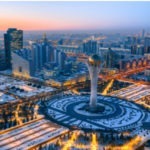While on February 13/14 Warsaw, Poland, hosted the US-sponsored and US-supervised Middle East conference – well attended by the representatives of the Arab countries but only by second-trier EU diplomats1)Poland offers a venue for the Middle East security conference and ends up double-crossed by its partners, Gefira. – the Astana Trio – Russia, Turkey and Iran – held theirs in the resort city of Sochi (the venue of the 2016 Winter Olympics);2)Iran, Russia and Turkey discuss Syria in Sochi, PressTV 2019-02-15; Joint statement by presidents of Iran, Russia and Turkey at end of Sochi summit, MEHR News Agency 2019-02-15. while the Warsaw event for all purposes and intentions was held to drum up support for a joint action against Tehran, the rival Sochi meeting addressed the on-the-ground situation in war-torn Syria, the makeup of the country’s future government, the formation of the constitutional committee, the restoration of the basic infrastructure in terms of water and electricity supply systems and the voluntary return of the many refugees.
Warsaw and Sochi, two simultaneous games of chess with two sets of chess pawns, swearing allegiance to different sovereigns or to none at all. Turkey, though formally a NATO member, used the occasion to strengthen its ties with Russia rather than its military ally the United States. Israel, though no NATO member, used the occasion of the Warsaw gathering to form a crusade against Iran, eliciting NATO countries’ aid; the European Union members, though predominantly members of the Atlantic Treaty, distanced themselves from the Middle East conference with Germany, as is known, continuing to cooperate with Russia over natural gas supplies.
Israel – and what follows the United States – has a keen interest in neutralizing Iran, whereas the Astana Trio (named so after the initial venue of the three in Astana, Kazakhstan) sought to capitalize on Assad’s success in the civil war and the resultant American pullout. Germany, France and the United Kingdom are playing into the hands of the Erdoğan-Putin-Rouhani axis in refraining from backing the Israeli-led orchestration of diplomatic steps aimed against Tehran. One may wonder whether or not Benjamin Netanyahu’s objective to rally support for his middle East policy misfired; there is something that the Israeli prime minister has achieved. Having hijacked the Visegrad Group of countries (Poland, Czechia, Slovakia and Hungary) in that his proposal to hold the group’s meting in Israel (of all the places) was accepted (whatever for?), he drove a wedge between Warsaw and the remaining members of the Group by offending Poles with the accusations of antisemitism and thus forcing them to break ranks with Czechia, Slovakia and Hungary still willing to participate in the V4 gathering in Israel. Iran may be a contentious issue in the Middle East and a threat to Israeli existence but the Jews worldwide have also set their sights on extorting from Poland a few billions of dollars as damages for Jewish property lost during World War Two in Polish territory.3)Poland to partially compensate Jewish, private-owned looted property, The Times of Israel 2017-10-13. A politically isolated Poland is more likely to fall prey to the extortion and one may rest assured that it certainly will not stop supporting Israel.
Tel Aviv has failed to create anti-Iranian coalition (as for now) but has succeeded in isolating Poland from its V4 allies and pressed further with the agenda of making it pay for Jewish property; the European Union has managed to operate independently of the United States; Turkey, Russia and Iran have coordinated their efforts to achieve a workable solution in Syria; the conference has turned out to be of no avail to the United States; the rift between Washington, Brussels and Ankara – NATO members – has grown larger.
The two meetings showed the emergence of three political constellations: (i) the European Union (with Poland falling between two stools with its loyalties divided between Brussels and Washington), (ii) the United States and Israel, (iii) and the Astana Trio.
References
| 1. | ↑ | Poland offers a venue for the Middle East security conference and ends up double-crossed by its partners, Gefira. |
| 2. | ↑ | Iran, Russia and Turkey discuss Syria in Sochi, PressTV 2019-02-15; Joint statement by presidents of Iran, Russia and Turkey at end of Sochi summit, MEHR News Agency 2019-02-15. |
| 3. | ↑ | Poland to partially compensate Jewish, private-owned looted property, The Times of Israel 2017-10-13. |




